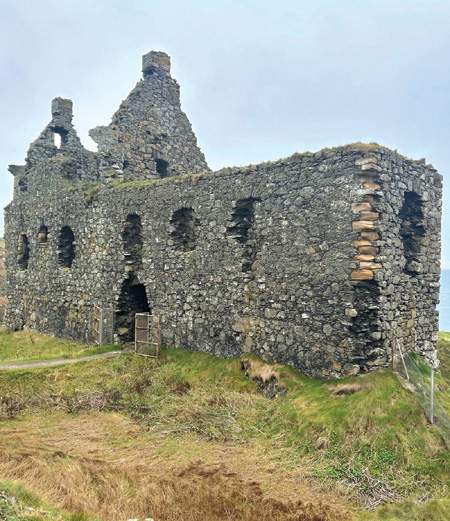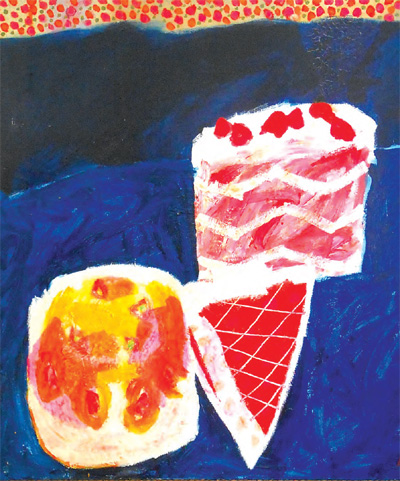
The old order changeth in the far South West
Mary Gladstone traces the artistic connections behind some current property movements in darkest Wigtownshire
IT HAPPENS to the best and, in some cases, the worst of us. Our housing situation changes and we down-size. Not only Mr. Mountbatten Windsor is calling in the removals, but also a couple of families in the Wigtown District of Dumfries & Galloway, whose large properties have belonged to them for generations.
Selling-up isn’t unusual. The posh have been doing it for decades, their piles consigned to rubble or turned into, you name it: hotels, schools, hospitals or even prisons and their grounds made into reserves for exotic animals or theme parks. In affluent times, these people often patronised the arts and these two Wig¬townshire families, now flogging their houses, were no exception.

Twelfth century Dunskey Castle
Monreith House, a listed Georgian man¬sion situated near Port William on the Machars peninsula, is up for grabs for £1,890,000. With the house, come 328 acres, several cottages and a private church. Monreith land has been in the Maxwells’ hands since the 17th century (possi¬bly longer).
One scion was the naturalist Gavin Max¬well, best-selling author of Ring of Bright Water in which he tells the story of his pet otter that lived with him near Glenelg in north-west Scotland. Gavin’s grandfather, Herbert, was a novelist, essayist, artist, antiquarian, horticultur¬ist and salmon angler, who catalogued his plants as they flowered by painting them daily until he died aged 92.
Ironically, it’s another artist’s paintings of Wigtownshire flowers that have stood the test of time, while Herbert’s are largely forgotten. Close to Monreith is the House of Elrig, built in 1912 by Herbert’s son and daughter-in-law, where they and their children lived. By the be¬ginning of World War II, the Maxwells had sold the house to the Czech professor, Emil Korner. It was to Elrig that fellow emigré , artist Oskar Kokoschka (1886 –1980) and his Czech wife, Olda, came each summer for several weeks between 1941 and 1946. Deemed a ‘degenerate’ by the Nazis, Oskar Kokoschka fled Austria in 1934 for Prague, obtaining Czech citizenship the following year. In 1938, he moved to the UK and remained here during the War.
Kokoschka was one of the greatest figura¬tive painters of the 20th century and his sum¬mers at Elrig, offering him respite from war-time London, enabled him to be more gentle and lyrical in his style than before.
He painted few oils dur¬ing this period, concentrating instead on water colours and sketches in coloured pencil. Wild flowers, animals, land¬scapes, seafood, game, inti¬mate portraits and scenes from daily life became his principal subjects. Kokoschka filled his sketchbooks with drawings that captured in a few strokes, the essentials of a scene.
During August and September 1945, Kokoschka’s series of water colours featur¬ing Doris, a relative of the Korners, with a cat on her lap, demonstrates his shift towards a softer, more affectionate representation.
When we consider his signature painting on long-term loan to the Scottish National Gallery in Edinburgh, of his ‘Self-portrait of a Degenerate Artist’, painted in response to his inclusion in the Nazis’ ‘Degenerate Art Exhibition’ in 1937, with its defiant pose and violent brushwork, it’s clear that Kokoschka’s Elrig visits helped to bring out in him a warm, emotional approach to his Expressionism. As for Doris and the cat, the artist used these sketches (‘Girl with Cat’) for his last oil painting (1973-76).
Also up for sale is Dunskey Castle, a 12th century tower-house, a ruin since 1700. Perched on a clifftop overlooking the Irish Sea, it retains parts of its cellar, watch-tower and north wing. It’s going for £ 100,000. Over the past three centuries various edifices on a site farther inland have become the family’s residence. Today, Dunskey House, an Edwardian manor, is a posh venue for parties and weddings.
Towards the late 19th century, David Hunter Blair owned Dunskey estate. While at Oxford University in 1874, he befriended Oscar Wilde and was called ‘Dunsky’ by his undergraduate pals. Whether Wilde ever visited the estate is open to question but the two men remained friends after they left Oxford. “I have a vivid recollection of him at our first meeting,” wrote Hunter Blair. “The large features lit up by intelligent, sparkling eyes, and a broad cheerful smile; an attractive personality, enhanced by his ex¬traordinary conversa¬tional abilities.”
Both were known for their wit, aesthetic interests and spiritual enquiry. Hunter Blair con¬verted to Catholicism. While his Oxford friends ignored his decision, Wilde was curious about it. Hunter Blair saw that Wilde was interested and tried to help him to convert by inviting him to Rome and arranging an audience for him with the Pope.
For the Catholic convert, their visit was unsuccessful, particularly when he saw how his friend was moved by the sight of Keats’s grave in the Protestant cemetery. Wilde lay prostrate before the grave, far more overcome with emo¬tion than he had been in his audience with the stiff Pope Pius IX.
Hunter Blair became a Benedictine monk and eventually an abbot. Ten years after Wilde matriculated at Oxford, Wilde called on his old friend in Edinburgh. On leaving him, he sank to his knees and said: “Pray for me, Dunskie, pray for me.”
Perhaps he knew what was in store for him.. At the end of his life, while in exile in Paris, Wilde converted to Catholicism. Hunter Blair never stopped praying for his old friend’s soul.
Who knows if the new owners of these Wigtown District properties will follow their predecessors in championing the arts. For an obscure, often forgot¬ten region, it’s good to know that the two Osc(k)ars found in it a haven.






